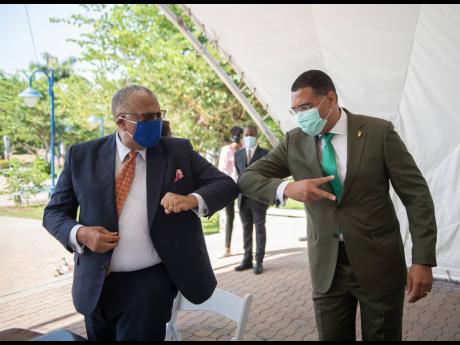HATE CRIME PLEDGE - PM vows tough sanctions; Phillips wants more teeth for watchdog
Prime Minister Andrew Holness says that a Jamaica Labour Party (JLP) administration will pass legislation to classify politically motivated offences as hate crimes after the September 3 general election.
At the same time, Dr Peter Phillips, the opposition leader, says that a People’s National Party (PNP) government would introduce legislative amendments to impose sanctions on those who breach the Political Code of Conduct.
Both recommendations were welcomed on Wednesday by Political Ombudsman Donna Parchment Brown.
Speaking at a ceremony where both Holness and Phillips signed the Political Code of Conduct on behalf of their parties, the prime minister said that hate crimes would not only include those linked to politics, but “crimes that can be seen to be motivated by the characteristic of a person”.
In some jurisdictions such as the United Kingdom, the term ‘hate crime’ can be used to describe a range of criminal behaviour where the perpetrator is motivated by hostility or demonstrates hostility towards a victim’s disability, religion, race, sexual orientation, or transgender identity.
Holness did not provide details about other possible offences that would be designated hate crimes under the proposed law.
He contended that it was obvious that “the potential is still in our culture for our politics to disintegrate”.
DELIBERATELY INVESTIGATING
The prime minister indicated that if acts of criminality took place in a particular context, they should be “deliberately investigated to discover if there was any motivation that was political in the crime”.
In his remarks, Phillips said he would amend the Political Ombudsman (Interim) Act to give teeth to the Political Code of Conduct.
“To a large extent, the code is just a plea, but we need to ensure that people who utilise public resources to influence and secure a vote should be held to book, and sanctions should be applied following an investigation,” he said.
Turning to another issue, Phillips said that political leaders should bridle their tongues if they don’t have the facts about particular incidents.
According to Phillips, political leaders “have a responsibility to measure their own words and comments and to ensure that they don’t, wittingly or unwittingly, contribute to violence or confrontation by loose tongue”.
“Political leadership must not sow the seeds of conflict where none exist,” he added.
His plea comes amid a surge in complaints of intimidation and vandalism that have become common in Jamaican political campaigns, prompting the prime minister, on Tuesday, to lambaste “a strategy by the Opposition of confrontation”. The Opposition has denied that claim.
Phillips urged candidates to display tolerance and goodwill and exercise influence over their supporters so that harmony can prevail on the campaign trail instead of an atmosphere of confrontation.
He urged the media not to use confrontational language in headlines which, he said, could “encourage a vision of conflict rather than one of harmony”.
The political ombudsman said that she was happy that both the prime minister and the leader of the Opposition recognised the need for legislative amendments to strengthen her office and other authorities to address breaches of the Political Code of Conduct.
While commending the use of moral suasion to curb public behaviour, Parchment suggested that tougher measures could offer a fix.
“The ability to quickly impose fines and have some legal liability, I think, will be good for Jamaica’s democracy and electoral process,” Parchment Brown said.

